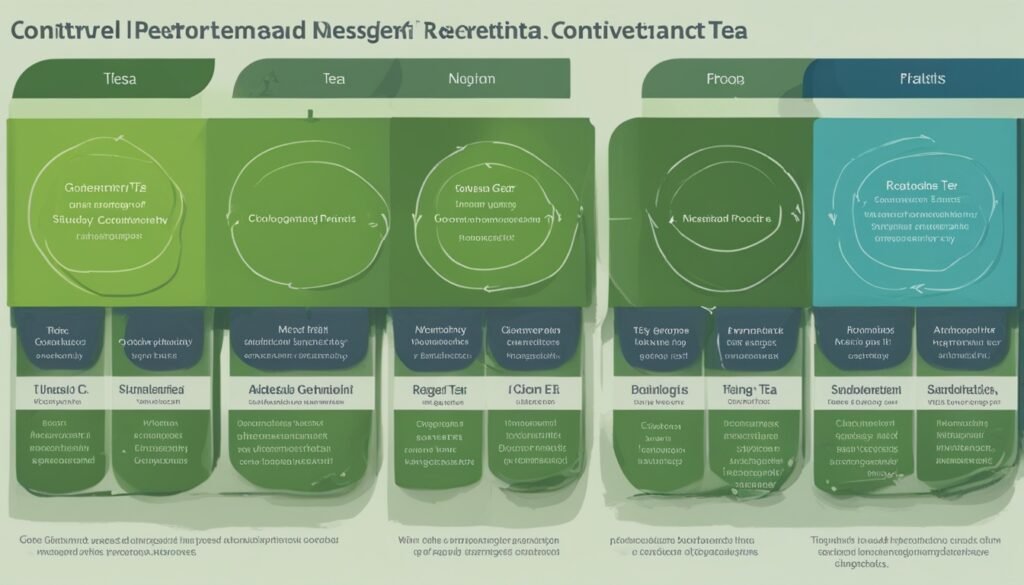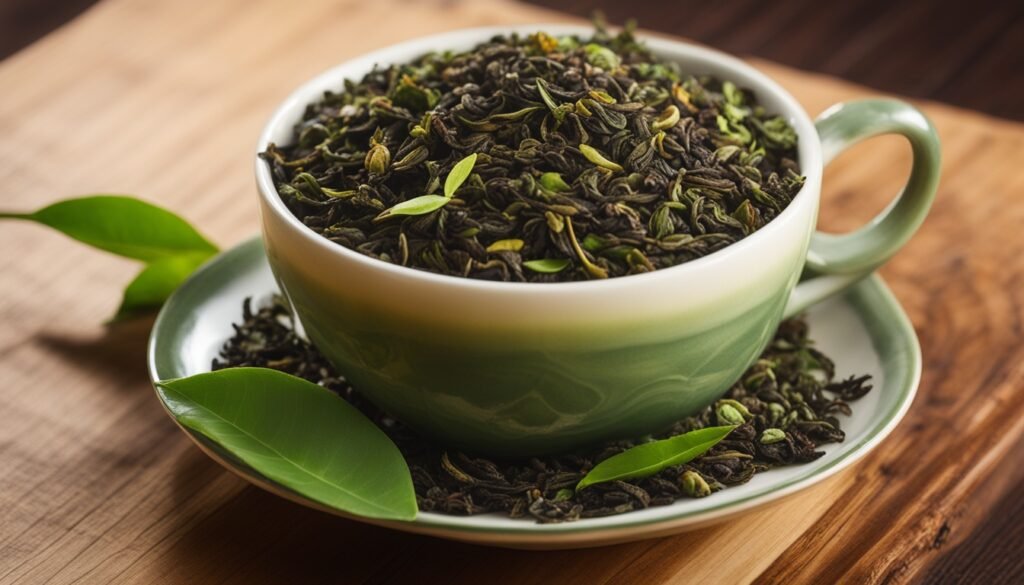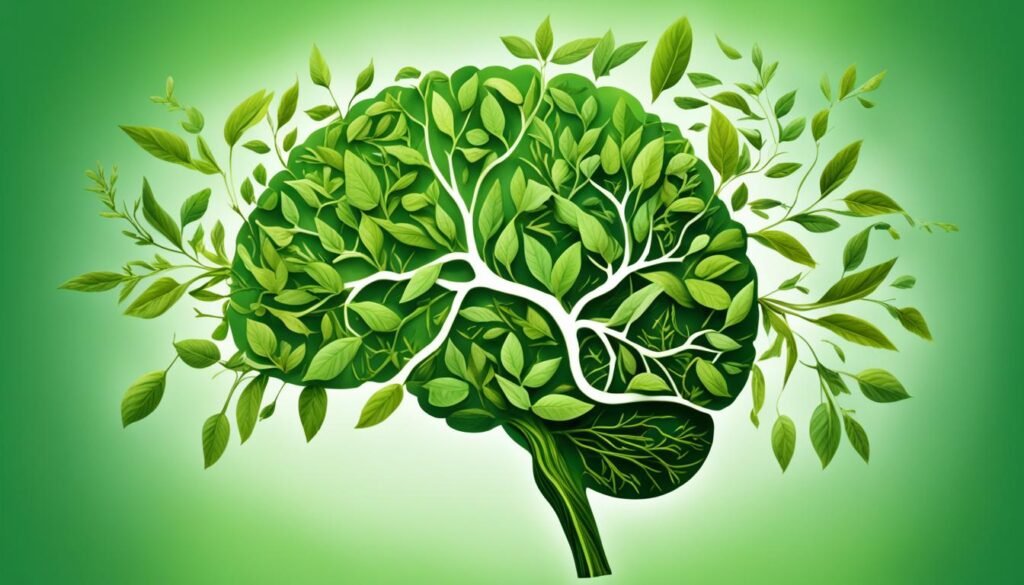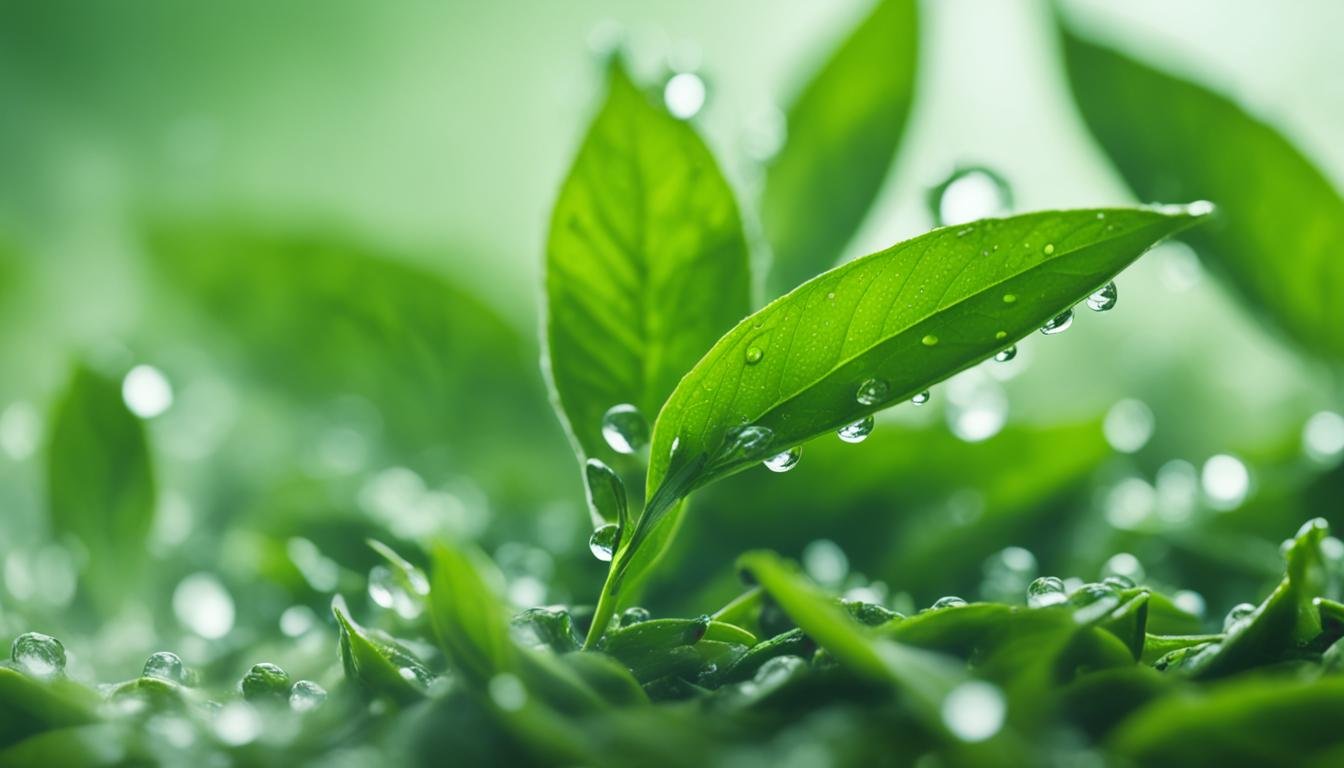A recent study shows that drinking some roasted green tea can boost how well you do mental tasks. Roasted green tea is called houjicha in Japanese. It gets its distinctive smoky taste and dark brown look by roasting it over charcoal. The study in Scientific Reports looked at how roasted green tea and plain green tea affected doing mental activities. They compared it to drinking plain water.
The Study: Exploring the Cognitive Benefits of Roasted Green Tea
This study looked at how roasted green tea might help the brain. It involved 20 young, healthy men from Japan. They were around 23 years old. The goal was to see how green tea, roasted green tea, and hot water affected their thinking and body reactions.
Experimental Design and Participants
The men did a 5-minute math task six times in one day, split between two sessions. In the first round, they drank hot water before three tasks. Then they drank hot water before resting. The second round, they had green tea or roasted green tea before the last three math tasks and before another break.
Measuring Mental Task Performance and Physiological Responses
The scientists carefully looked at 11 body reactions during these math tasks. They wanted to understand how hot water, green tea, or roasted green tea influenced how well the men did. They also asked the men how they felt about being tired, stressed, and how they handled their tasks.

Improved Task Performance with Tea Consumption
Compared to hot water, tea improved task performance notably during work. Especially with roasted tea, people completed more tasks and got more answers right. This shows that the smell in roasted green tea might boost how well we think and focus.
Practice Effect: A Potential Limitation
Still, the researchers noted something important. Doing the same math task six times in a day might make you better at it. They called this the practice effect. It could explain why tea drinkers did so well. So, the study’s results need this point taken into account.

Reduced Fatigue and Stress with Roasted Green Tea
During all sessions, task performance was better with tea consumption than water. Only roasted green tea showed anti-fatigue properties. This was despite having less caffeine than regular green tea. People felt less tired after drinking roasted green tea, especially in the session’s latter half.
The study found that roasted green tea might have special effects. It can help lower fatigue and stress levels during tough tasks. This discovery is key. Less tiredness and stress lead to better thinking and feeling good overall.
The researchers did not see differences in stress levels between the groups. This hints that the smell compounds in roasted green tea might mainly help lower tiredness rather than stress directly.

These results reveal the promise of roasted green tea for boosting mind power and resilience. Adding roasted green tea to your day could lead to less tiredness and stress. This supports your brain’s health and how well you work.
Physiological Responses: Moderated Stress and Arousal
When people did tasks, drinking green tea or roasted green tea made a big difference. It lowered tissue blood volume (TBV), tissue blood flow (TBF), and near-infrared responses (NIRS) more than hot water did. So, the teas might have helped control heart and blood reactions to stress.
Lower Tissue Blood Volume and Flow
The teas caused less tissue blood volume and tissue blood flow in people. This shows that the teas’ smells might have made it easier for people to stay calm during tasks.
Parasympathetic Nervous System Activation
Studying the different parts of heart rate changes linked to parasympathetic parts in the tea group was important. It showed that the teas might have switched on the part of the nerves that relax us. This would explain why stress levels dropped.

Aromatic Compounds: The Key to Cognitive Enhancement
The study showed that certain aromatic compounds found in green tea can help you relax. They may even affect the brain in ways that boost mood and make you more alert. For example, compounds like pyrazines in roasted green tea are known to change brain activity directly.

Roasted green tea, or houjicha, smells different than regular green tea because it is roasted. The roasting process creates special scents called pyrazines and other volatile compounds. These unique smells are thought to make the tea better for your brain and help with feeling good.
We’re still figuring out how these aromatic compounds work their magic in green and roasted green tea. But, what we do know is that they might talk to our brains in ways that affect chemicals and how our neurons work. This could lead to feeling more relaxed, concentrated, and performing better mentally.
Is roasted Green tea improve Brain Functioning?
Potential Mechanisms and Limitations
The research shows that having just a bit of green or roasted green tea daily can boost how well we do tasks and make us feel better. It’s thought these teas’ sweet smells might change the way our brains work. This can make us feel happy, relaxed, and more focused.
Long-Term Implications and Future Research Needs
But, the study doesn’t have many people in it and didn’t last a long time. Also, doing the same math tests over and over might have made people better at them (“practice effect”). More work is needed to really see what drinking green tea every day could do over the long haul.
If we look at more people of all ages and check their progress over time, we could learn a lot more. We could also find out what makes these teas so good for our minds. This, in turn, could help make treatments that work even better.
Incorporating Green Tea into Your Routine
Adding green tea to your daily life can bring many health benefits. But, it’s key to keep a few things in mind. Try different brands and how you brew it. Also, don’t drink more than a few cups a day to stay safe from side effects.
Dosage and Considerations
If you take medicine for high blood pressure or thin your blood, know that green tea might interact with it. Plus, if you’ve had kidney stones before, watch out because green tea has a lot of oxalates. For those who are sensitive to caffeine, be careful. Too much green tea can bother your sleep and make you feel anxious.
Alternative to High-Caffeine Beverages
Green tea has less caffeine than coffee or black tea, making it a good pick for keeping focused but not too wired. The mix of L-theanine and caffeine helps you stay both calm and alert. This beats the jitters and crashes you might get with high-caffeine drinks.
The Science Behind Green Tea’s Brain Benefits
Green tea’s health perks come from its rich mix of plant chemicals. It’s full of flavan-3-ols which include several catechins. These and other flavonoids help improve brain health.
Antioxidants and Neuroprotective Effects
Green tea’s compounds act as antioxidants and offer neuroprotective effects. They may boost cognitive skills. Studies show the polyphenols in green tea, like EGCG, guard the brain from harm. This might lower the chances of memory loss and brain diseases as we age.
L-theanine, an amino acid in green tea, helps you stay calm but focused. It makes you alert but not jittery. This, along with some caffeine in green tea, is thought to amp up mental performance. Studies found a link between drinking tea and doing better on tasks.
Although research is ongoing, the exciting news about green tea’s brain benefits is promising. We still need to figure out all the ways green tea helps our brains. But, experts suggest adding green tea to your day can assist in keeping your brain healthy.

Thanks for sharing. I read many of your blog posts, cool, your blog is very good.